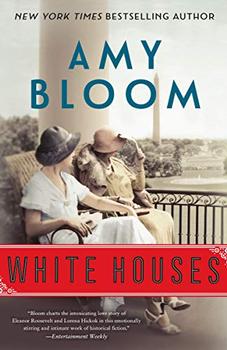Summary | Excerpt | Reading Guide | Reviews | Beyond the Book | Read-Alikes | Genres & Themes | Author Bio

This article relates to White Houses
Eleanor Roosevelt had long been a key figure in her husband, Franklin Delano Roosevelt's, political career. When he became President, she transformed the role of the First Lady. She was a vocal and vociferous advocate for human rights and in particular, the rights of women and children. She wrote a popular newspaper column "My Day," and was active in helping the poor and fighting racial discrimination. After her husband's death, President Truman appointed Eleanor Roosevelt to the United Nations. She was given further appointments by President John F. Kennedy, serving her country faithfully until her death in 1962.
But in the partnership of two exceptional public servants there were significant difficulties. In 1914, FDR embarked on an affair with his wife's social secretary, Lucy Mercer. When Eleanor found love letters between the two in 1918, the Roosevelts nearly divorced. FDR broke up with Lucy Mercer—although evidence exists that suggests the ties between them were never truly severed and Lucy was at his side when he died in April 1945.
 In White Houses, Amy Bloom suggests that FDR also had a long-standing love affair with his secretary Missy LeHand with whom he worked extremely closely. Evidence for this seems to rest with the Roosevelt's son, Elliott, who described the relationship in his 1973 book, An Untold Story, The Roosevelts of Hyde Park. Whatever the truth of it, FDR's personal life has long been a subject of speculation, inspiring the movie, Hyde Park on Hudson (2012) starring Bill Murray and Laura Linney.
In White Houses, Amy Bloom suggests that FDR also had a long-standing love affair with his secretary Missy LeHand with whom he worked extremely closely. Evidence for this seems to rest with the Roosevelt's son, Elliott, who described the relationship in his 1973 book, An Untold Story, The Roosevelts of Hyde Park. Whatever the truth of it, FDR's personal life has long been a subject of speculation, inspiring the movie, Hyde Park on Hudson (2012) starring Bill Murray and Laura Linney.
For readers of White Houses, however, the central Roosevelt love affair, is Eleanor's. After discovering her husband's affair with Lucy Mercer, Eleanor is believed to have agreed to remain married but insisted on separate bedrooms. During Roosevelt's first presidential campaign, Eleanor met Lorena Hickok, an Associated Press reporter and they became close friends with Hick even moving into the White House.
Over the years, the two maintained a very intimate, loving and presumably sexual relationship. Readers who want to know more about the factual history behind the story in White Houses can find several non-fiction titles, including, most recently, Susan Quinn's Eleanor and Hick: The Love Affair that Shaped a First Lady (Penguin, 2016).
Filed under People, Eras & Events
![]() This "beyond the book article" relates to White Houses. It originally ran in March 2018 and has been updated for the
October 2018 paperback edition.
Go to magazine.
This "beyond the book article" relates to White Houses. It originally ran in March 2018 and has been updated for the
October 2018 paperback edition.
Go to magazine.
Your guide toexceptional books
BookBrowse seeks out and recommends the best in contemporary fiction and nonfiction—books that not only engage and entertain but also deepen our understanding of ourselves and the world around us.